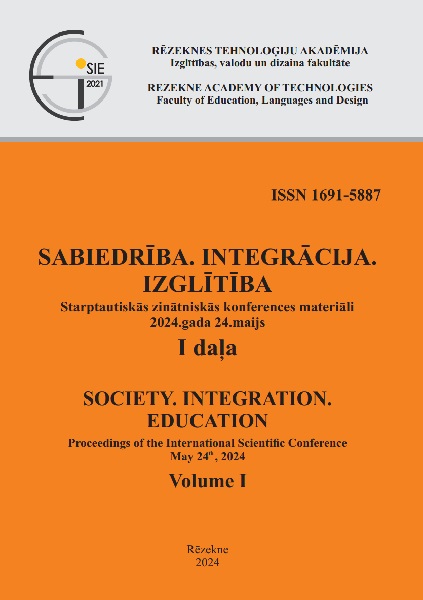HEI SUSTAINABLE COMMUNICATION IN SOCIAL MEDIA: E-COURSE EVALUATION VIA TRIANGULATION METHOD
DOI:
https://doi.org/10.17770/sie2024vol1.7847Keywords:
e-course evaluation, higher education institutions, ranking, social media, sustainability communication, sustainable communication, triangulation methodAbstract
Given that sustainable communication is already a complex phenomenon, the role of social media, currently growing rapidly, is underestimated by universities and academia. The present research aims at analysing the e-course “The power of social media in the professional development of teachers: personal brand, tools for educational products, promotion of sustainable development values” for HEIs teaching staff. The exploratory research was leveraged in this work for the e-course construction and evaluation. The exploratory empirical study was implemented in 2022-2023. The empirical study was built on the triangulation method referred to data collection and data analysis. The sample was composed by six trainers, 15 participants, and two experts. HEIs sustainable communication in social media is beneficial for all the involved as it supports just green transition, e.g. by lowering the carbon emissions by, for example, commuters, aimed at reducing climate impact and mitigating climate change. The empirical study allows drawing a conclusion that the e-course “The power of social media in the professional development of teachers: personal brand, tools for educational products, promotion of sustainable development values” for HEIs teaching staff was positively evaluated. The positive evaluation proposes that the e-course is effective and efficient.
References
Ahrens, A. & Zascerinska, J. (2020). Comparison of Teacher’s and Students’ Ranking of English for Academic Purposes Sub-Topics. Education. Innovation. Diversity, 1(1), 16-25.DOI: https://dx.doi.org/10.17770/eid2020.1.5328
Ahrens, A., Purvinis, O., Zaščerinska, J., Micevičienė, D., & Tautkus, A. (2018). Burstiness Management for Smart, Sustainable and Inclusive Growth: Emerging Research and Opportunities. IGI Global. Pages: 226. DOI: 10.4018/978-1-5225-5442-4
Ahrens, A., Zascerinska, J., Bikova, A., Aleksejeva, L., Zascerinskis, M., & Gukovica, O. (2023). A New Development Model of Sustainable Communication for Higher Education Institutions. Education. Innovation. Diversity, 2(6), 30-48. DOI: https://doi.org/10.17770/eid2023.1.7175
Ahrens, A., Zaščerinska, J., Amanzholova, S., Aleksejeva, L., Zaščerinskis, M., Aleksejeva, A., Gukovica, O., & Abjalkiene, I. (2021). A Multi-sided Needs' Analysis for Designing a Master Programme in the Field of Information Technologies at a University in Kazakhstan. In: Scientific printed works of 10-th International Scientific Conference «Perspectives of Economic and EU Development», 23-25 June 2021, pp. 9-12.
Ahrens, A., Zaščerinska, J., Lange, C., & Aļeksejeva, L. (2021). A Comparative Analysis of Processes of Conceptual Change for the Enhancement of Implementation of Green Energy Education and Training. International Journal of Information and Education Technology (IJIET) vol. 11, no. 1, pp. 47-51, 2021. doi: 10.18178/ijiet.2021.11.1.1488
European Commission, Joint Research Centre, GreenComp. (2022). The European sustainability competence framework, Publications Office of the European Union. Retrieved from https://data.europa.eu/doi/10.2760/13286
Mackey, J., Gilmore, F., Dabner, N., Breeze, D., & Buckley, P. (2012). Blended learning for academic resilience in times of disaster or crisis. J. Online Learn. Teach. 8, 122–135.
Marginson, S., & van der Wende, M. (2007). To Rank or To Be Ranked: The Impact of Global Rankings in Higher Education. Journal of Studies in International Education, Vol. 11, No. 3/4, 306-329. DOI:10.1177/1028315307303544.
Versteijlen, M., Wals, A.E.J., & van Wee, B. (2023). Design and evaluation of a sustainable blended study programme in higher education. Front. Educ. 8:1222962. DOI: 10.3389/feduc.2023.1222962
Zaščerinska, J. (2013). Analysis of Needs in Students‘ Communicative Competence within English Studies for Academic Purposes from Educators‘ View. Scientific Papers University of Latvia Volume 790 Pedagogy and Teacher Education, p. 86-97. Published by Latvijas Universitāte, Rīga, Latvia.






